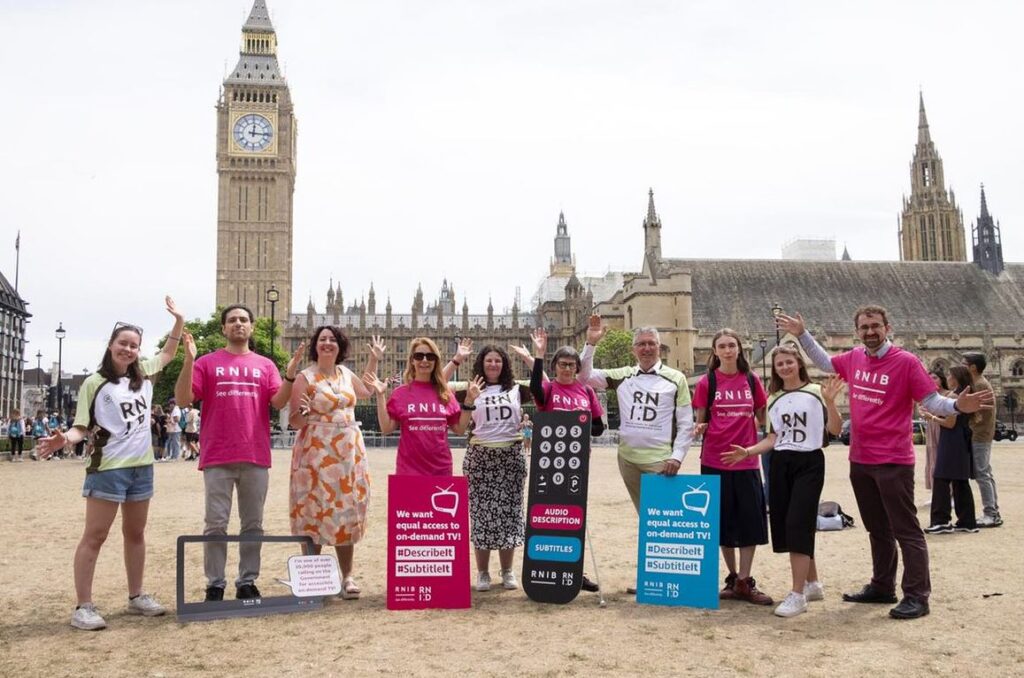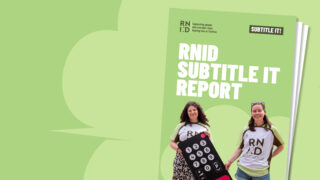In today’s digital age, on-demand TV offers great convenience and a wide range of content. However, these programmes are not accessible to everyone. Without subtitles or signing interpretation, TV is unwatchable for many people who are deaf or have hearing loss.
Subtitles and accessibility features such as sign language interpretation play a vital role in breaking down barriers and creating a more inclusive viewing experience. This ensures that everyone has equal access to entertainment, information, and education.
Support our ongoing campaign to demand broadcasters make their content accessible and for the Government to make subtitles a requirement on more services.

The problem is wide-ranging exclusion
Our communities aren’t just missing out on entertainment. People who use subtitles or signing are excluded from Government briefings, important news updates, and conversations with friends and family, leaving them feeling frustrated, disappointed and excluded.
This isn’t good enough.
We’ve been campaigning for change since 2015 and, in 2017, the Government amended the Digital Economy Act to give Ofcom the power to regulate the level of accessibility on on-demand services.
But still this law hasn’t been enacted. We recently checked in with our communities about what improvements had (or hadn’t) been made. The results weren’t good.
We found that:
97% of respondents had tried to watch a programme in the last year and found there were no subtitles.
80% of respondents told us that the lack of subtitles stopped them from watching the programme.
60% of deaf BSL users told us they needed an interpreter to access live broadcasts of government announcements.
Explore the Subtitle It! Report 2023
“I’m left feeling fed up, sad, angry, and excluded because of my deafness. I’m paying for these services like everyone else and I shouldn’t have to cope with this discrimination when subtitles aren’t available.”
– Brent, RNID volunteer. Brent has progressive, severe hearing loss. Read his story.

Our impact so far
Our supporters have helped us achieve a lot since the launch of our Subtitle It! campaign in 2015.
The Subtitle It! campaign so far: a timeline
2024
Our campaigner’s support is driving the change we need for improvements in subtitle and signing provision across various platforms.
- In September 2024, Stephanie Peacock (Minister for Sport, Media, Civil Society and Youth) responded to our joint letter with RNIB confirming the Government’s commitment to making television content accessible to all audiences.
- In May 2024, the Government passed the Media Act 2024, which put the minimum quotas for subtitles and signing on on-demand services into law ensuring equal access to TV shows for people who are deaf or have a hearing loss, wherever and whenever they are watching a programme.
2023
In March, the Government published the Draft Media Bill, which included part of the secondary legislation necessary to enact the regulations on on-demand services.
It adopted Ofcom’s recommendations for quotas for subtitle, signing and audio description provision but also introduced the concept of ‘Tier 1 services’, which would cover the services that would be obliged to meet the quotas.
2022
- From winter 2021 to spring 2022, we ran a joint petition with RNIB calling on the government to introduce legally binding subtitle, signing and audio description quotas. Over 25,000 of you signed, and on 12 July we handed it in.
- On 1 August, the Minister for Digital responded: “The Government supports a digitally inclusive society, in which television content should be accessible for all UK audiences, regardless of the platform you choose to watch or listen to it… with more than 3/4 of households now using video-on-demand services; it is now essential that these services provide appropriate accessibility.”
However, we remained concerned about the lack of a clear timetable for bringing in the regulations. - We secured a meeting with the Minister of State for Media, Data, and Digital Infrastructure, Julia Lopez MP in November 2022. The Minister confirmed the Government’s commitment to regulate and make on-demand TV accessible and to do so at the earliest possible opportunity. She also said she wants the regulations to be futureproof, which we welcomed, given how quickly the on-demand TV market changes.
2021
- In May, Ofcom conducted a survey to learn more about the viewing habits and preferences of BSL users.
- In July, Ofcom published their final recommendations, giving the government everything they needed to enact the law. The targets they recommended were:
- 40% of on-demand content should be subtitled within 2 years of the legislation coming into force, rising to 80% after 4 years.
- 2.5% of on-demand content should be signed within 2 years of the legislation coming into force, rising to 5% after 4 years.
- We wrote to the Minister for Digital Infrastructure urging them not to delay any further. Read our open letter.
2020
- In July, Ofcom’s second consultation was published. It proposed the recommendations from the first consultation should apply to services with 200,000 unique visitors a month and where the costs of access services come to less than 1% of ‘relevant turnover’. We responded, setting out the needs of viewers who are deaf or have hearing loss:
-
- we strongly argued against ‘technical exemptions’ where providers and platforms weren’t willing to work together to provide subtitles
- subtitles do not provide equivalent access as BSL for deaf people. The needs of the BSL community should not be traded away against other forms of sensory loss
- an interim one year target should be included, to create reputational risks for those who don’t comply
- providers should not be allowed to offer subtitles merely on one platform. Each service on each platform should include accessibility as the norm
- this is a long overdue change in the law that shouldn’t be delayed any further. As soon as Ofcom publishes it recommendations, we will restart our work to campaign for the implementation of the rules.
- In September, Ofcom’s consultation closed to responses. We expected Ofcom to make final recommendations to government on the regulations in late 2020.
2019
- In November, the government wrote a letter to Ofcom, requesting a second consultation to get more information on some of the key parameters of the legislation, to help them understand how it should operate in practice.
2018
- Ofcom carried out a consultation to establish quotas for how much on-demand content must carry subtitles. Thousands of you contributed to our consultation response to Ofcom, in which we called on TV providers to move towards fully accessible content for those who are deaf or have hearing loss. Read our press release about Ofcom’s 2018 consultation.
- Ofcom reported back to government and made recommendations on the regulations, proposing that 80% of content should be subtitled and 5% should be signed within four years of the legislation coming into force. We welcomed these recommendations and publicly called on the government to implement them as quickly as possible.
2017
- Thanks to the support of our campaigners, in early 2017 the Digital Economy Bill was successfully amended to promise new powers to the regulator of TV, Ofcom, to set on-demand subtitle quotas for broadcasters.
- In April, this Bill became The Digital Economy Act 2017.
2016
- We recruited subtitle users to Sky’s subtitle trials and by September 2016, Sky started to roll out subtitles.
- We’ve worked with other service providers to encourage them to drive up subtitle levels, resulting in providers such as BT committing to the investment of technology to allow subtitles to be shown on its on-demand programmes.
2015
- You told us that accessible TV was really important, so we launched ‘Subtitle It!’ in June.
- Sky (the UK’s biggest paid-for TV provider) subtitled just 4% of its on-demand content. We worked with deaf teenager Jamie Danjoux to promote his petition calling on Sky TV to add subtitles to its on-demand services. In summer of that year, Sky made a public commitment to take action.
How you can help
If you’re not yet a member of our Campaigns Network, then join us and demand better access for people who are deaf and have hearing loss.
An enormous thank you to all of you who have supported this campaign. Together, we’ve achieved so much – but there’s more to do.


